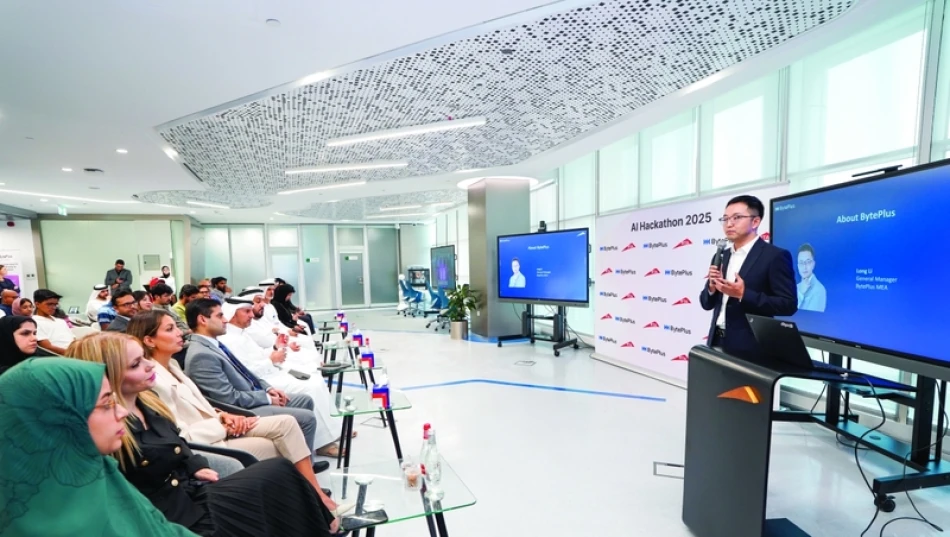
Dubai's Roads Authority Organizes Generative AI Hackathon Leveraging Open Data
Dubai's Transport Authority Leverages AI Hackathon to Shape Future Mobility Solutions
Dubai's Roads and Transport Authority (RTA) has concluded a strategic hackathon focused on generative artificial intelligence and open data, drawing over 70 university students to develop AI-powered transportation solutions. The initiative signals Dubai's accelerating push to integrate cutting-edge technology into urban mobility infrastructure, positioning the emirate as a testbed for next-generation transport innovations ahead of its ambitious autonomous vehicle goals.
Strategic Partnership Drives Innovation Pipeline
The hackathon, titled "Generative AI Meets Open Data," was organized through a collaboration between RTA's Public Transport Agency, Technical Support Services, and Strategy and Corporate Governance sectors, partnering with BytePlus, a global technology company known for developing innovative technical solutions. This partnership model reflects Dubai's broader strategy of leveraging private sector expertise to accelerate public innovation.
The competition specifically targeted RTA's open datasets, challenging participants to create AI-driven mobility solutions that could address real-world transportation challenges. This approach mirrors successful innovation frameworks seen in Singapore's Smart Nation initiative and Estonia's digital governance programs, where government agencies provide data infrastructure while private innovators build applications.
Talent Acquisition Through Competitive Innovation
The hackathon serves a dual purpose beyond immediate solution development. By attracting creative minds from outside the traditional government framework, RTA is essentially crowdsourcing innovation while building a pipeline of tech-savvy talent familiar with Dubai's transportation ecosystem. This strategy has proven effective in other innovation hubs, where competitions often serve as recruitment tools for both government agencies and private companies.
Structured Evaluation and IP Protection
RTA's Strategy and Corporate Governance sector played a crucial role in coordinating with universities, colleges, and startups, while establishing clear evaluation mechanisms for submitted ideas. Notably, the authority has implemented systems to register innovative concepts and protect intellectual property rights—a critical factor that often determines whether hackathon innovations translate into real-world applications.
Market Implications and Future Partnerships
Nine teams advanced to the final round, presenting their projects to expert panels representing RTA and its strategic partners. The winners will be announced at the Dubai World Congress for Self-Driving Transport 2025 in September, creating a direct pipeline from student innovation to industry showcase.
The timing is strategically significant. Dubai has committed to making 25% of all transportation autonomous by 2030, requiring substantial technological infrastructure and innovative solutions. By identifying promising concepts early through competitions like this, RTA can potentially accelerate development timelines while reducing costs compared to traditional procurement processes.
Regional Innovation Race Intensifies
This hackathon positions Dubai competitively within the Gulf region's growing tech ecosystem. While the UAE has established itself as a regional fintech and logistics hub, neighboring Saudi Arabia is investing heavily in NEOM's futuristic transportation concepts. Qatar is developing smart city infrastructure ahead of ongoing major events, and Kuwait is modernizing its digital government services.
The integration of generative AI specifically into transportation planning represents a frontier area where early movers could gain significant advantages. Unlike traditional transportation modeling, AI-powered systems can potentially predict and adapt to changing mobility patterns in real-time, offering more responsive urban planning capabilities.
Investment and Development Outlook
For investors and technology companies, RTA's approach suggests a maturing market for transportation technology solutions in the Gulf region. The authority's commitment to potential partnerships with winning teams indicates genuine intent to implement successful concepts, rather than treating the hackathon as merely a public relations exercise.
The emphasis on open data also signals Dubai's confidence in its digital infrastructure maturity, suggesting that the emirate views data transparency as a competitive advantage rather than a security concern—a perspective that could attract international technology partnerships and investment.
Most Viewed News

 Sara Khaled
Sara Khaled






